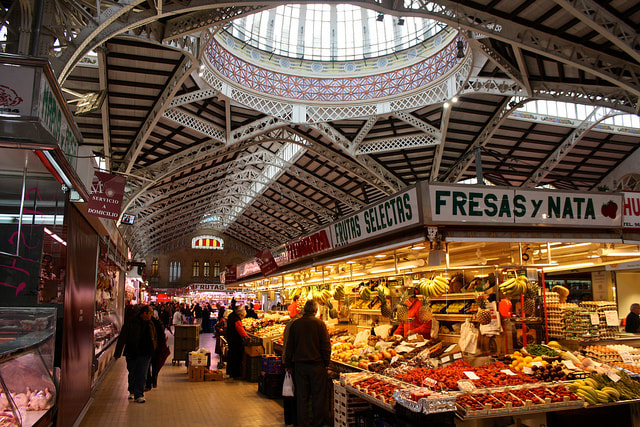|
Where to now for the self-centred isle of Britannia? Where to for the European Union, a collection of twenty seven nations bound together by treaties and hope for a brighter future? The EU would do well to take a hard look at itself and figure out what will bind the twenty seven remaining countries together more strongly post Brexit. My vote is for radical reform of the Common Agricultural Policy (CAP) which is not fit for purpose. The macroeconomics of the EU market, more often than not, impacts harmfully in local markets and towns. It has forced a one-size-fits-all on farming across twenty seven countries meaning ever more homogenous large scale farms. The farmer’s first job was to figure out how to get the subsidy and then how to work the system selling in to the EU market to turn a profit. Thus the livelihoods of small farmers have been all but destroyed as the CAP grant favoured scaled up scenarios.
Yet, anecdotally, it feels like the small farmer is well placed to make a comeback in terms of local markets thriving. Less harm to the environment, better tasting food, market stalls replacing carparks, prices for food that reflect the real economics of farming. The CAP subsidy could be exchanged for an EU directive on minimum pricing for food bought by big distributors from farmers located in the jurisdiction. Then fair competition needs to be brought back —hypermarkets using predatory pricing to sell everything from prawns to lawnmowers has destroyed the concept of the village square, the market place with butcher, baker, candlestick maker, fishmonger, hardware store, post office, bank. The Irish government could regulate this by planning to introduce a ban on hypermarkets along with free public transport shuttles and bicycles within and around all town centres. In València, in Spain, there is the most fabulous covered food market right in the centre of the medieval city. Local markets abound across many European towns and villages. When you go there you remember what it means to live a daily life and mingle with others buying their daily provisions. Cork is the only place in Ireland that I know of where the original 'English' market has remained in such a format — not only is it a major tourist attraction, you can buy great food there. Closer to my home the organic local farm stand with limited produce (only what is in season) is packed with customers queuing up each Sunday in Dun Laoghaire People’s Park. The potatoes still have the dirt on them (this is a good sign!). Knowing the food has not been sprayed excessively, knowing it has not caused a huge carbon footprint in being transported to the market stall, knowing you are helping your farming neighbours feels right. Buying food this way is meaningful compared to the hollow feeling of trailing your trolley down a supermarket aisle with tens of thousands of plastic wrapped products screaming for your attention. Every country had its own system of feeding themselves before globalisation. It is the excess of imported foods wrapped in plastic; it is the addiction to having tomatoes, avocados and bananas available twenty-four-seven; it is thinking there is only one way to buy food that has us addled beyond belief. Most of us no longer understand the difference between need and want. This is what philosophers sometimes call the problem of expensive tastes. I empathise with the farmers who were blocking Aldi. That hypermarket doesn’t care one jot about its suppliers but it does care about Irish customers as long as they keep on coming in the door for the cut price deals. “The supply chain is delivering mega profits for factories and retailers at the expense of farmers.” Joe Healy, president of the Irish Farmers’ Association said. He’s right. Cheap food with hardware teasers of loss leaders. There is something wrong when you pop the discounted €4 chicken into your trolley thinking about what to make for dinner and in the next moment you throw in an Aldi Ferrex Petrol Chainsaw too, because you really need it, and you know you’re worth it. I have to admit though, I do have a fondness for bananas. I might have to pay €3 per banana some time down the line (to reflect its proper cost) if my ideas are implemented. Special treat for Sundays, chopped up in my porridge made with Irish oats and topped off with a slug of Kerry cream and Wicklow honey. ©Alison Hackett posted 27 Feb 2020 Photograph: Mercado Central, València http://www.simplyvalencia.com The views expressed in this blog are my own. The faults too (if you find them) are mine. Comments are closed.
|
AuthorAlison Hackett — Director and founder of 21st Century Renaissance; author of The Visual Time Traveller 500 Years of History, Art and Science in 100 Unique Designs Archives
February 2023
Categories |
ReviewsThe Visual Time Traveller
This is a labour of love, insanity, beauty and, perhaps, an attempt to reintegrate history, art and science together again. Simon Cocking Irish Tech News Crabbing Her range of language is both staccato and soft, in succinct verse, which encourages you to read this aloud, truly the best way to engage in the emotional depth of a poem. Deirdre Conroy Sunday Independent Poetic Licence in a Time of Corona Your poems tell us all we need to know Ryan Tubridy, RTE Radio podcast |
CONTACTNOT RETAIL
21st Century Renaissance The Glasshouse Harbour Court, George's Place Dun Laoghaire, A96 R8CT Co. Dublin, Ireland E [email protected] VAT number 3761911TH |
© Twenty-First Century Renaissance Ltd 2022 Associate member of Publishing Ireland; Member of Independent Publisher's Guild All rights reserved


 RSS Feed
RSS Feed